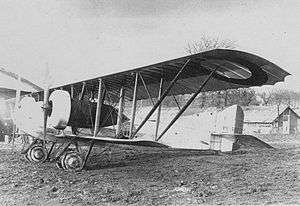Caudron G.6
| G.6 | |
|---|---|
 | |
| Role | Reconnaissance aircraft |
| Manufacturer | Caudron |
| Designer | Paul Deville |
| First flight | 1916 |
| Primary user | Aviation Militaire |
| Number built | 512 |
|
| |
The Caudron G.6 was a French reconnaissance aircraft of World War I. It married the wings and engine layout of the unorthodox Caudron G.4 to an all-new fuselage of conventional design. Over 500 of these aircraft were used by the French military for reconnaissance and artillery-spotting duties in 1917 and 1918.
Operators
Specifications
General characteristics
- Crew: Two, pilot and observer
- Length: 8.60 m (28 ft 3 in)
- Wingspan: 17.22 m (56 ft 6 in)
- Height: 2.95 m (9 ft 8 in)
- Empty weight: 940 kg (2,072 lb)
- Gross weight: 1,435 kg (3,164 lb)
- Powerplant: 2 × Le Rhône 9Jb, 97 kW (130 hp) each
Performance
- Maximum speed: 150 km/h (96 mph)
- Endurance: 2 hours 30 min
- Service ceiling: 4,725 m (15,500 ft)
- Rate of climb: 4.4 m/s (866 ft/min)
Armament
- 2 × .303 Lewis guns in flexible mount for observer
- up to 100 kg (220 lb) of bombs carried externally
References
- Taylor, Michael J. H. (1989). Jane's Encyclopedia of Aviation. London: Studio Editions. p. 240.
- World Aircraft Information Files. London: Bright Star Publishing. pp. File 891 Sheet 17.
This article is issued from Wikipedia - version of the 11/1/2016. The text is available under the Creative Commons Attribution/Share Alike but additional terms may apply for the media files.